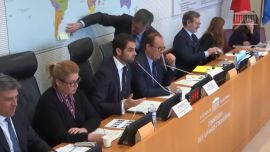The European Union’s independent watchdog has launched an inquiry into the bloc’s trade agreement with the Mercosur after environmental and rights groups complained that the deal does not respect the EU’s legal obligations.
The European Commission, which negotiates trade agreements on behalf of EU member countries, and the Mercosur bloc (Argentina, Brazil, Paraguay and Uruguay) announced in June last year that they had clinched a deal, two decades after negotiations were first launched.
When the deal was agreed, its signatories praised it as a pact that would integrate a market of some 800 million people, remove most tariffs on EU exports, ease border checks, cut red tape, and strengthen political and cultural ties.
But a group of NGOs argues that the commission, which prides itself on putting the environment at the heart of its policies and of playing a leading role in climate change talks, ignored its legal obligations to ensure that the deal would not do any social or economic or environmental harm, or lead to rights abuses.
“I have decided to open an inquiry into this complaint to examine the concerns put forward,” EU Ombudsman Emily O’Reilly told commission President Ursula von der Leyen in a letter, which was made public on Friday.
The groups – ClientEarth, Fern, Veblen Institute, La Fondation Nicolas Hulot pour la Nature et l’Homme and International Federation for Human Rights – claim that the EU commission concluded the deal without having a proper assessment of what damage it might cause.
"The Commission did not respect its legal obligation to guarantee that this agreement does not imply social, economic and environmental degradation, or human rights violations," the groups said back in mid-June.
The commission published a “draft Sustainability Impact Assessment” for the trade part of the agreement on its website on Wednesday. Spokesman Daniel Rosario noted that the assessment is the second one to be made public throughout the long negotiating process.
“We need the commission to explain to what extent this vitally important environmental assessment actually fed into the commission’s policy choices during the negotiations,” ClientEarth Trade and Environment lawyer Amandine Van Den Berghe said in a statement.
O’Reilly said the NGOs believe that the interim report “does not take on board the latest information available” and that it should have been made available when public consultations on the agreement were being held.
She asked that von der Leyen reply to the allegations within three months.
Rosario said the commission intends to respond in full to the concerns raised by the Ombudsman and that “we are confident that in these replies we will be able to demonstrate the sound administrative practices that we’ve followed in this case.”
He said that Brussels has, over the years, organised many meetings with civil society groups so that they can provide input and that the next one will be held on July 22.
All 27 EU countries must approve the Mercosur deal. Parliaments in Netherlands, Austria and the Belgian region of Wallonia have already indicated their opposition to the deal in its current form. Other nations, including France and Ireland, have also indicated reservations about this agreement, which will affect the agricultural sector, especially livestock.
Legal work continues on the text, which must then be translated and ratified by all countries involved. European Trade Commissioner Phil Hogan said Monday he hoped this stage of the process would be completed by October.
"Then it is up to the [EU] Council and the European Parliament to decide where and when they want to proceed and whether they want to ratify this agreement," said Hogan.
– TIMES/AFP/AP
























Comments